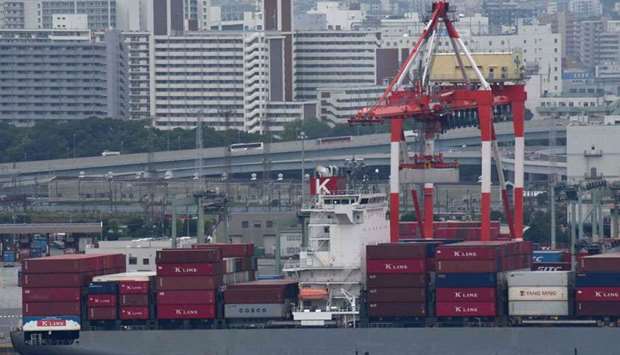Japan’s exports to the United States fell for the first time in 17 months and Japanese business sentiment soured amid worries about US President Donald Trump’s protectionist trade policies.
Exports to the United States dipped 0.9% in June from the same period a year ago on waning shipments of cars and semiconductor manufacturing equipment, two of Japan’s most important export products.
Thursday’s trade data came on the heels of the Reuters Tankan, which showed business sentiment slipped in July, reflecting companies’ fears about an intensifying trade dispute between the United States and China.
The batch of data highlighted concerns among Japanese policymakers who worry Trump may resort to tariffs or other protectionist measures to fix trade imbalances with Japan under his “America first” policy.
The government cut its view of business sentiment and warned that it must be “vigilant” about the impact that Sino-US trade frictions could have on the global economy, which would in turn affect export-reliant Japan.
“Overall exports remain healthy for now, but we are not sure how things are going to turn out on the trade policy front,” said Shuji Tonouchi, senior market economist at Mitsubishi UFJ Morgan Stanley Securities. “It’s possible talk of tariffs and trade friction could reduce corporate investment.”
With Japanese imports from America down 2.1%, Japan’s trade surplus with the United States widened 0.5% year-on-year to ¥590.3bn ($5.24bn). That could make it a potential target for Trump’s protectionist policies.
Japan’s global exports rose 6.7% in June, while imports gained 2.5%.
The Reuters Tankan, which tracks the Bank of Japan’s closely watched quarterly tankan survey, found manufacturers’ sentiment index stood at 25 in July, down one point from June, and the service sector’s mood fell to 34 from 35 in the prior month. The index subtracts the percentage of companies that feel negative about the economy from those who are optimistic, so a positive number means more businesses are upbeat.
Concerns about protectionism were widely cited in the Reuters poll of 483 large- and mid-sized companies, of which 268 responded between July 2-13.
Exporters of cars, precision machinery and metal products were among those who dragged down manufacturers’ sentiment.
Earlier this month the United States and China slapped tit-for-tat duties on $34bn of each other’s goods.
“Our clients are increasingly taking a wait-and-see stance on capital expenditure in the face of uncertainty over trade friction between the United States and China and the EU,” a manager of a machinery maker wrote in the survey. “Uncertainty is rising over capital spending plans at our client firms due to the expansion of protectionist policies and geopolitical risks,” said another machinery maker.
The manufacturers’ index is seen rising to 29 in October, while the service-sector index is expected to hold steady, after July’s decline led by real estate/construction firms.
In its monthly report for July released yesterday, the government kept intact its assessment for a seventh straight month that Japan’s economy was “recovering at a moderate pace”.
But it said business sentiment was “almost flat,” a bleaker view than in June when it said the mood was improving. The downgrade came after the BoJ’s tankan survey showed business confidence worsened for a second straight quarter in April-June, reflecting companies’ jitters over Trump’s protectionist policies.

A freighter is anchored at the international container pier at Tokyo port. Japan’s exports to the US dipped 0.9% in June from the same period a year ago on waning shipments of cars and semiconductor manufacturing equipment, two of Japan’s most important export products.
